wertblog
This domain serves primarily as a platform for the rant on everything and anything that interests wert.
Thursday, August 24, 2006
Apple made a Creative Truce
Apple Computers and Creative Technology had amicably settled their differences. Apple will pay $100 million to license Creative's technology and use it in its iPods, with the opportunity to get back a portion of the fees if Creative is able to license that technology to other companies.In addition, Creative would start making accessories like headphones, speakers for the iPod as a member of Apple's "Made for iPod" program.
Win or Loss? For Apple, I think it is just some pocket change to get rid of a pesky compeititor and get them to make products for you. US$100m is a drop in the ocean compared to the US$1.5 billion that iPod had generated. With other lawsuits regarding iTunes in Europe and the challenge of the Microsoft upcoming Zune player and its music service, Apple would be glad to settle this cloud over their head and put their energies elsewhere.
Creative? Maybe, it is a graceful way to exit from the lawsuits and get something out of it. Creative had made a loss of US$118m loss last year, and the settlement would happily wiped it off. I do wonder if making accessories for iPod would hurt the sales and development of Creative's own Zen music players. However, iPod does have a overwhelming lead in market share, and it may signal that Creative might end their own line of music players and put their bets on the accessories business.
Technorati: Apple, Creative, copyright, iPod, music player.
Read ST Forums for laughs
In the aftermath of the National Day Rally, there are quite a number of interesting letters to the ST. In fact, almost all of the letters refered to the rally speech.Most of them are fairly well thought out and have valid points. While ST is not noted for its sense of humor, the forum section shows that Singaporeans are ingenious jokers. One of them deserved even more of a mention than the last funny one.
Aug 23, 2006
S'poreans have to pay a price for not heeding govt's plea for more babies
I missed Prime Minister Lee Hsien Loong's National Day Rally Speech on television last Sunday.
When I read about it in The Straits Times the next day, a sudden sadness overwhelmed me.
The Singapore government has decided to be more aggressive in attracting immigrants with talents of all kinds to Singapore with the offer of Singapore permanent residence status, once purportedly aimed at graduates, professionals, bankers, lawyers and the like.
What a huge price Singaporeans have to pay for not heeding the government's persistent plea for higher birth rates among its people, and to be less picky about jobs.
I am for the Singapore government's move to import foreign talents to fill the gap and boost the economy by creating job opportunities as entrepreneurs.
But I shrug at the thought that some native Singaporeans, especially the young and educated of marrying age, do not think it their duty to marry and procreate as part of nation-building, and the unemployed who still fuss over jobs, choosing to remain jobless rather than accepting a job below their expectations.
Singaporeans should not be complacent. Nation-building is our utmost duty and responsibility.
Lee Pai Ping (Ms)
I am speechless on reading this wonderful letter.
All I can say that if it is a joke, it is another good one. And wow, Singaporeans are finally developing their sense of hurmor, I must that I am the most impressed.
I wished Ms Lee all the best in her future procreation and may she singlehandedly save Singapore from ruin.
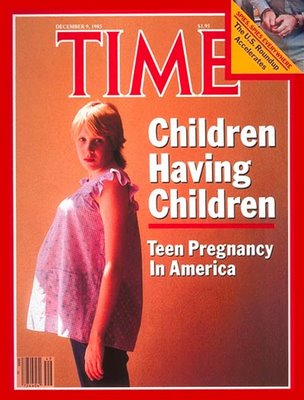
Solution?
Technorati: singapore, immigration, birthrates
Wednesday, August 23, 2006
Mee Siam Mai Hum
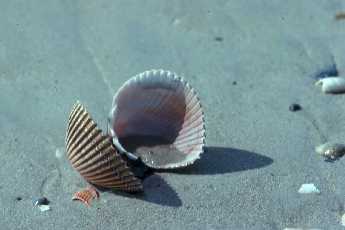
Our dearest PM had made a goof during his National Day Rally Speech. Much had been said on his now (in)famous Mee Siam Mai Hum.
Mee siam is a local Singapore dish, basically it's vermicelli served in spicy soup with other ingredients.Our PM mentioned the phrase as an exmaple on how he can "connect" with Singapore heartlanders just as easily as mr brown's (a local blogger) bak chor mee (another local dish) man.
Hum means cockles in Hokkien. Mai Hum simply means "No cockies please".
"Mee Siam Mai Hum" would simply refer to ordering a bowl of mee siam without cockles.
So what is so funny? Well, unfortunately mee siam DO NOT go with cockies in the first place. The phrase "mee siam mai hum" is kinda of similar to "no durian in my steak please" Thus, our PM's effort in showing how "connected" he is totally backfired.
What to make of this? Surely it is unintended mistake on our dear PM's part. I think he was meant to say "mee siam mai hiam", which means "mee siam with no chilli please". However, his poor command of basic singlish let him down. Well, maybe it is partly because his English is so perfect, so Standard Queen English that he would have grave difficulties in understanding the local slang. Our PM has to speak to international leaders and foreign talents (in proper English!) regularly and so it is not strange for him to find such local slangs very foreign.
Beside, a lowly dish like mee siam would not consist of any part of his regular diet and so his unfamilarity with the local dish is understandable. Our PM has to provide valuable leadership to all Singaporeans day in, day out. He has to eat the most nutritious food for the benefits of all Singaporeans, otherwise Singapore might just disintegrated, with riots etc.
YET yet....Our PM made the effort to "connect" with ordinary Singaporeans. Such a noble effect should be rightly praised and clapped upon. I hope fellow Singaporeans can focus on the kind intentions that our PM has and moved on from this honest mistake.
Despite the mistake, we are allowed to enjoy the podcast and the ringtone. So enjoy!
Technorati: singapore, mee siam mai hum, podcast, ringtone
Saturday, August 19, 2006
Zune First Looks
Gizmodo had scored the first exclusive photo of MS Zune player a couple of days ago. Just slipped my mind to post it. Read More here...
Zune is also confirmed to have video, check out the video at Zune Insider.
Technorati: Zune, music player
Lee Kuan Yew : I'll be there, I will stand with you.....in 2011
I nearly choked when I read this while having dinner.In 2011, Lee Kuan Yew will be 88 and still no one can replaced him? I find that it's hard to imagine how he could take on another five year term. He would 93 at the end of that term.
But oh well, I don't think it makes much difference if he stays on or not. LKY don't look like the type to fade away gracefully once he steps down. Even if he leaves the government, he is bound to be a "Mahathir" and hounded those who don't follow his
The part on PAP losing power in the forseeable future is errr...a scaremonger's tale. I don't think we would have more than 10-15 non PAP MPs in the parliament 2-3 elections from now. In Singapore, the State is PAP and PAP is the State. It is something that would take either a long time or a total collapse to change.
As for the "buzz", it usually refer to something that is new and hot, something that is youthful and everchanging. In a way, it can be said that LKY himself is the greatest obstacle to "buzzilness". To reinvent himself and become "buzzy" with tourists, we can pick up a hint from our "socialist brothers".
It had been proven that mausoleums do attract lots of tourists and it would be certainly unique in South East Asia. It is a great way for all the great leaders to maintain their "buzziness" forever.
Afterthought: The CNA report had totally missed out on the first bold quote in the Malaysian article. Kind of strange....

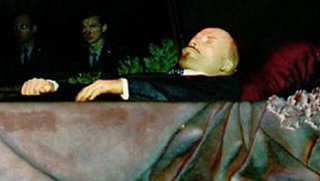
hush....quiet! Better hope that malaysia don't kick the bucket jump the gun first.
The Bernma article via Little Speck.
SINGAPORE, Aug 19 (Bernama) -- Age may be catching up on modern Singapore founding father Lee Kuan Yew, but he is not about to give up politics yet.
Lee told a gathering here last night that if he was fit and capable, he will contest in his Tanjong Pagar GRC stronghold.
"If I am still fit and capable of making another speech like this, I'll be there, I will stand with you," Lee was quoted by The Straits Times as telling a National Day Dinner here.
One of Asia's iconic and influential figure, Lee, 83, won unopposed the Tanjong Pagar GRC in the general elecion on May 6 this year. The next general election is due by 2011.
He cautioned Singaporeans not to take for granted that the People's Action Party (PAP) will always form the government.
"The trouble now is that Singaporeans believe we'll always have a PAP government... one day they'll wake up and they'll find the opposition is the government, a miscalculation," he said in the report.
Lee, Singapore prime minister from 1959 to 1990, remained an influential figure in Singapore politics after stepping down from the post.
In the cabinet of successor Goh Chok Tong, he was appointed as the Senior Minister. He is now the Minister Mentor under the cabinet of Lee Hsien Loong, his eldest son.
Lee told Singaporeans that the island state needed to move ahead and compete.
"We must have a different kind of Singapore," he said, adding that Singapore's "orderly, very wholesome, very clean" image was no longer enough.
Singapore must become a city with a "buzz" to attract tourists, he said.
"If you want to compete beaches on beaches, forests, lakes, seaside, you lose. You can't beat Thailand, you can't beat Malaysia, you can't beat Indonesia and you can't beat Philippines, but we can become the Paris in Southeast Asia."
-- BERNAMA
Technorati: singapore, singapore politics, lee kuan yew
Thursday, August 17, 2006
Yet Another Forum Letter
I saw another forum letter which is highly amusing.Aug 17, 2006Oh well, is the author trying to do a satire? I am not too sure but if he is...Lucky Tan got some serious competition.
With the PAP in charge, who needs opposition parties?
I find it amazing that many people can be so pissed off with the Singapore Government. What for?
I am no politician but a working man. I do not have many facts but I know what I want and what I need.
We have many jobs in Singapore and unemployment is not a major problem. We have good housing. Our economy may not be super but it's good enough in that our Sing dollar is stronger than some other currencies.
We have a low crime rate. At least I know that I don't fear walking down the street with the thought of being killed or stabbed. So there's no problem with jobs, housing, getting food on the table.
It's a pretty safe place to live in; no problem in getting big foreign investors to invest and create jobs in our country. So what is the problem?
Many people say that Singapore is not democratic enough. But which country in the world is truly democratic? I don't think there is one because it's impossible.
The USA? UK? Many Americans and British opposed the idea of going to war in Iraq. Not all opposed it, but almost half the population did. Opinions were split, at least in the UK.
Yet what did Tony Blair and George Bush do? They did not wait for another round of UN inspections and talks, etc. They invaded Iraq the moment they could.
Correct me if I'm wrong. Isn't democracy supposed to be when the majority or everyone is for the idea, and action is taken? That's the whole reason for consulting the public in the first place. Otherwise what's the use of it?
So if it's not the case of making Singapore a super, truly democratic country, what's the problem? Getting more opposition into parliament? But why? Is the PAP doing something wrong?
I cannot honestly see what's wrong. All I can see is that the need for jobs, food, housing and security are all met.
So what is the PAP doing wrong? Do we want to get more opposition into the parliament for the sake of it? So that the PAP will not be the dominant party? But why?
Will the opposition really do anything different that I want? I cannot imagine having any more needs other than jobs, food, housing and security. And I find the PAP is doing a good job at them. So why would I want anything different?
Why spoil something that's already working? If one day the PAP starts to get things wrong and there are no more jobs, housing becomes amazingly expensive or there is none at all, or if I cannot walk down the street without peace of mind, I would then say that the PAP is finished.
We should change things. That is when I would want a good opposition that can change things to be in the parliament and make a difference to Singapore.
But for now, do we need that?
Han Fook Kwang
Liverpool, United Kingdom
Reasons why Mr Han might be a closeted satirist.
- Mr Han is far from a simple working man, but a very important man in Singapore. (see below) Certainly not living on a working man's salary.
- Giving your location is not a requirment. No reason for Mr Han to list his current location as UK. I assume he is only there for just a short while, as he is holding such important jobs in Singapore. Thus, he might be making the point of the grass is always greener on the other side.
- I wonder if he is making references to the efficency of the police on Yawning Bread, Mr Wang and Little Speck recently.
- I find it very strange that Mr Han as the Editor of The Strait Times, had find the need to write to his own forum page, strangely without supplying his appointment.
- The part on how much foreign investments we are attracting recently got me linked to this on Intelligent Singaporean.
- Finally, on democracy, we can think of the protesting during IMF/World bank meeting
Let me give more background on Mr Han, without whom there will be no ST on our breakfast table.
Han Fook Kwang, 53, was from the Singapore administrative service. He started his career in The Straits Times as a senior leader/feature writer in 1989. He was promoted to associate political editor in 1992 and became the political editor in 1995. Promoted to his current post as Editor in 2002.
He co wrote with Warren Fernandez and Sumiko Tan, Lee Kuan Yew: The Man and His Ideas.
He is also in the Executive Committee of the Land Transport Authority. (LTA)
This is only what a simple google search dig up in 5 seconds. I am not surprised if Mr Han holds other important appointments in our society. I wished Mr Han the best of luck in his new founded interest in satire . Hopefully he will be do even better than Mr Lionel De Souza and Mr Khoo Lih-Han.
For the very curious, here is a photo of our new funny man at the lauch of STOMP. Foreground, second from left.

Updated : Suddenly, it occurs to me there might be another Mr Han Fook Kwang writing in from UK. If so, I must apologise to the "real" Mr Han Fook Kwang of ST for the mistaken identity.
Technorati: singapore, singapore media
Friday, August 11, 2006
Chiam and Sitoh
Just this week, there is a public spat in Potong Pasir over some broken lights. I will start off by recalling the facts of this case.- Six of the eight solar-powered lights (costing a princely $20,00) installed by Mr Sitoh had been vandalised. Those lights are along a concrete footpath leading to the MRT station - thus highly utilised by residents.
- Mr Sitoh refused to repair the lights. He had leased the land from the Singapore Land Authority early last year to set up the lights. Lease for the land runs out on Oct 31 this year.
- It is illegal for Mr Chaim to use town council funds for the repairs, because the land in question was not under the council's jurisdiction.
- No lights leading from MRT to esate, residents suffer.
I find it's strange that such a small and simple matter of repairing lights can escalate to such a degree. It is a simple and straight forward job of calling a contractor and getting it fixed. But why? Well, politics. This is a classic case whereby politics is played at the expense of the public welfare. (think upgrading)
For Mr Sitoh, his enthusiasm for serving the residents of Potong Pasir had markly ebbed after the election. Almost immediately after the election, Mr Sitoh, along with Mr Eirc Low cancelled most services they had provided in the two opposition-held wards. It's simple, no votes, no help. The lease for the land only ends in October, thus strictly speaking they are under the responsiblity of Mr Sitoh. If he isn't even responsible enough to fix the lights which is bulit by him on the property leased to him, I don't have the confidence that if elected, he would be responsible for other public areas.
One can only wonder if he is more enthusiastic in winning the election or serving the people of Potong Pasir. On the same measure, he could as easily cancelled the services even if he had won the election.
I don't know Mr Sitoh personally, so I think it's harsh to pass such judgement on him. Maybe he is just following his party strategy to do the minimal. Furthermore, the past defeated PAP candidates in non PAP held wards like Mr Andy Gan and Mr Heng Chee How were "transfered" to a GRC in the next election, so it's hard to blame Mr Sitoh for being less "enthusiastic" in Potong Pasir and planning for his "new hunting ground".
As for Mr Chaim, I think he is slow in addressing the concerns of residents. But at least he had belately addressed their problem.
Aug 11, 2006I do not know Mr Chaim personally too, so I can't be sure if he isn't trying to pass the buck. What I know is that at least Mr Chaim care enough about the residents to do something. My hope is for both of them and other MPs to remember: they are to serve the residents. Please do not pass the residents' welfare to each other as a political smashball.
Spotlight put up and link way planned
I REFER to the article, 'Mah: Chiam should focus on residents' (ST, Aug 9).
Mr Mah Bow Tan, as a minister of over 15 years, should know that I, as the MP for Potong Pasir for 22 years, have been serving the residents there faithfully.
As regards the dispute concerning the solar lamps, I would like to inform the minister that my town council immediately installed alternative lighting once it learnt that six of the solar lamps were spoilt. The footpath between the MRT station and Block 147 is now brightly lit with a powerful spotlight.
Mr Mah may also like to know that whereas the PAP members are only planning to carry out improvement works, we in Potong Pasir have already awarded contracts for repair-and-redecoration works for 31 blocks and work will commence soon.
A covered linkway will be built at the said footpath once permission is granted. Other projects are being planned.
The solar lamps were installed by Mr Sitoh Yih Pin and the Citizens' Consultative Committee along the footpath without the town council's knowledge. Now, Mr Mah and Mr Lim Boon Heng are of the opinion that I, as the elected Member of Parliament, should bear responsibility for the mistake made by Mr Sitoh and the CCC. If the PAP indeed holds this view, it does not augur well for the future of PAP politics.
Chiam See Tong
MP-elect for Potong Pasir
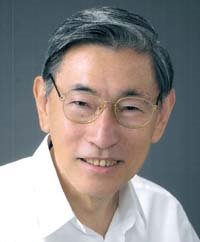

One had to jump through hoops to serve the people, the other jumped ship.
Technorati: singapore, potong pasir, chaim see tong, sitoh yih pin, singapore politics
Monday, August 07, 2006
Save the Brown Elephants !
Every (wo)man deserve a good laugh a day. I can't stop laughing inside when I saw this a couple of minutes ago and I really want to share it.Good job, Talking Cock! More cock years ahead!
Technorati: singapore, talking cock, national day, brown elephant
Saturday, August 05, 2006
State of Media (foreign editon)
After rumbling on the effects of blogging on the mainstream media, let's us explore the foreign media in Singapore.Ministry for Information, Communications and the Arts (MICA) announced that the five foreign publications would be classified as "offshore newspapers," Of the five, Far Eastern Economic Review (FEER) has to comply the conditions as such by Sep 11. As an offshore newspaper, FEER has to appoint a legal representative in Singapore to deal with any lawsuits that may arise against the publisher. It will also have to post a security deposit of S$200,000. For the other four publications - the International Herald Tribune, Financial Times, Newsweek and Time - will be subjected to the same rules once their current licences expired.
To quote the now very familar Ms K Bhavani, press secretary to the Minister for Information, Communications and the Arts.

"We are rectifying an anomaly for FEER, which has been a declared foreign newspaper since December 1987. It was an administrative oversight not to have subjected FEER to the conditions which are required for declared foreign newspapers to circulate in Singapore,"I would ask why FEER is singled out among the other four papers? and how does this oversight happened? Well, some had pointed to the recent article that FEER had published in its most recent edition (July/August 2006) for the reason. The article can be summarised with 2 words - Dr Chee. Yes, him again. The liar, the bad egg and political gangster. The magazine had refered Dr Chee to a national "martyr" due to the numerous lawsuits against him. In the article itself, Dr Chee had made some uncomplimentary observations on the Singapore Government. It certainly could be regarded as pro opposition and "hostile" or "libellous".
"When FEER became a monthly publication in December 2004, it ceased to be an offshore newspaper but it continued to be a declared foreign newspaper. We should have continued to subject FEER to the same conditions as other declared foreign newspapers, namely the Wall Street Journal Asia and offshore newspapers,"
This kind of article while nothing new at all might have attracted special attention because it seeks to paint the Dr Chee in a "softer light" in the same way Singapore Rebel attempted to. It wouldn't fit very well with the image that the local press had bulit on him and might change Singaporeans impressions. Hence, that might be why the article had invoked the same stern reaction as Singapore Rebel. The full article can be found here
What I don't understand is why the government would seek action against FEER in such unseemly haste. Firstly, many would not have notice the article otherwise. FEER has a circulation cap of only 10,000 copies locally. It wouldn't get more than 50,000 eyeballs at the very most. I would go further and say that I don't even know of the existence of this esteemed paper before the accouncement. For this reason, I am not sure it's the best of moves.
This kind of high handed restriction might not sit very well with the young Singaporeans and might stir their rebellious spirit for more of the same. Worse, it certainly attract more attentiion to the offending magazine than it would otherwise had. The local mainstream media would have to bear some degree of responsibilty for such behaviour because of it's tendency to report only the "good news", thus driving them to seek more independent news.
Of course, the above is just baseless internet batter and coffeeshop talk. The MICA might be doing its routine cleanup and the timing is just unfortunate.
Meanwhile, the Reporters Without Borders had condemned the Singapore government for intimidating foreign publications to censor themselves. The media watchdog had ranked Singapore 140th out of 167 countries in its 2005 worldwide press freedom index.
Updated: A reader had pointed out to me that FEER had been served with papers and asked to apologise as well as pay damages before the accouncement.
Technorati: singapore, singapore media, media freedom, FEER, Reporters Without Borders,
Friday, August 04, 2006
Featuring Yet Another iPod Device... iBrella
Well, the next time you see someone shaking around, twisting himself, spinning his umbrella do not called the IMH. He is probably just listening to his iPod in the rain.Here is the documentation on operating the iBrella. It's simple really, the controls involved shaking the iBrella, twisting it, opening and closing it. Don't believe it? Watch the video. :)
Technorati: iPod, iBrella, youtube, umbrella
Thursday, August 03, 2006
SBS Transit Balance Sheet
After reviewing the balance sheet of SMRT, we would take a look at the SBS balance sheet. The public transport company had applied just before the deadline to "adjust" fares.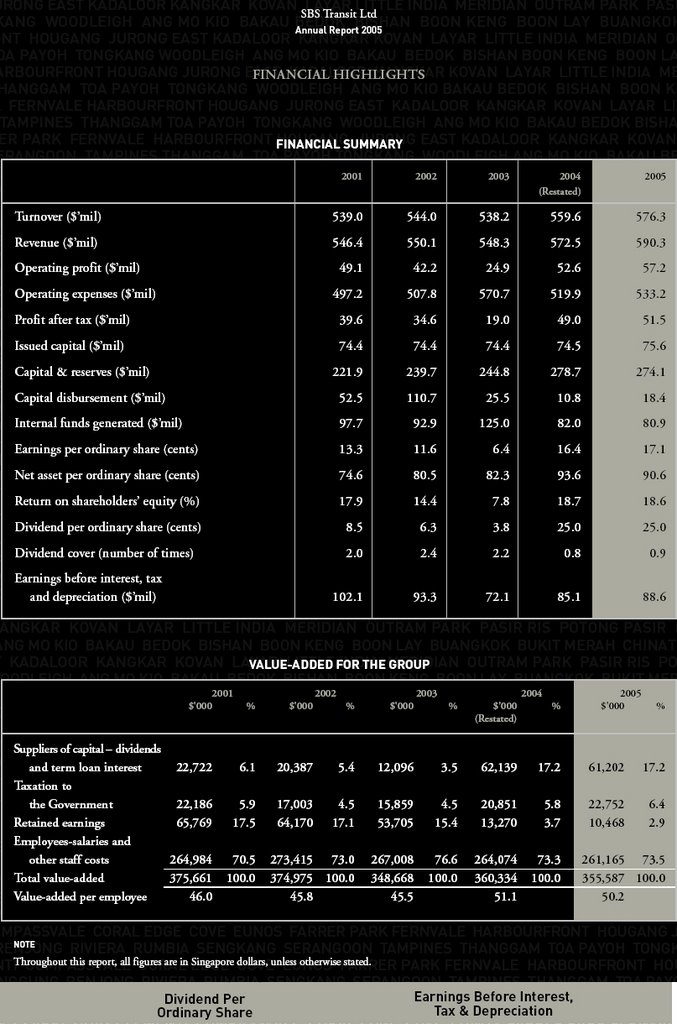
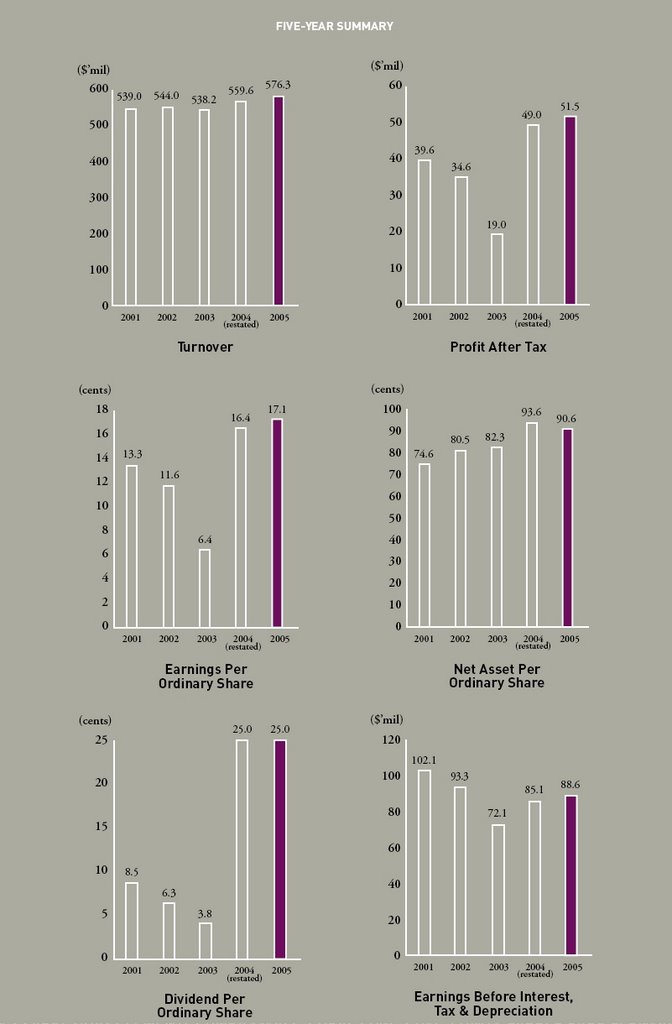
SBS is profitable but of a much lesser scale than SMRT. However, their profit after tax increased slightly in the last Financial Year despite of the rising oil prices. They had, like SMRT made record profit in the previous year. I can also point out to the greatly increased dividend to shareholders in the last two years.
Again, I have no head for business. Hopefully, someone else can make use of the figures and explain the finanical situation more clearly.
Technorati: singapore, SBS Transit, balance sheet, transport hikes
Wi-Fi Beware....
Security researchers David Maynor and Jon Ellch showed attendees at the Black Hat USA conference, a video in which they took about 60 seconds to compromise a MacBook.How? Just by targeting its wireless card and wireless device driver. What's more, It's not limited to Macs. By exploiting bugs in four different wireless cards, the researchers found ways to seize control of laptops running Windows and Linux as well.
It's not limited to laptops either, desktops are not spared. The root of the problem lies in the wireless standard 802.11 more commonly known as Wireless B and Wireless G. The standard itself is large and complexed and complexity is a hacker's best friend. Furthermore, as vendors rush to implement the new complex wireless standards, security is often compromised for speed. Thus, wireless device drivers are often "buggy" and poorly written.
In the Black Hat demostration, Maynor was able to create, read and delete files on the Apple laptop. The MacBook, which was running a fully patched version of the latest Apple operating system OS X, showed no indication that it had been compromised. OS X is regarded as one of the more secured operating system, so I think it's fairly alarming to the millions of Windows users.
I think it might turned out to be a nightmare locally. In any HDB block, you can easily detect dozens of wireless networks. Maybe, we can reconsider the good, old ethernet cable.
Technorati: Black Hat, internet security, wireless exploit
Tech is the girl new best friend
What do women want?A question asked by millions of men. Diamonds are out and plasma TV are new in thing for women.
The Girls Gone Wired survey of 1400 women and 700 men aged 15 to 49, found that more than three quarters of women would choose a plasma TV over a diamond solitaire necklace. The survey was commissioned by the Oxygen Network, a female owned and operated cable TV channel.
Could that be anyway related to diamonds being more common and cheaper and thus less exclusive? OR could the myth of women being clueless with tech just a myth? Let's see what else the survey uncovered.
- On average, women own 6.6 technology-driven devices while men have 6.9
- 80 percent of women feel comfortable with new technologies
- Nearly half of the 1,400 women surveyed perform their own computer trouble-shooting procedures
- 86 percent would prefer a new digital video camera to a pair of designer shoes.
- More than half of the female respondents would pick a plasma TV over a two-day vacation in Florida


The old flame and new love.
Technorati: technology, women.
Tuesday, August 01, 2006
Youth inclined to be "quiters"?
Here is an interesting article on Sunday Times entitled: ONLINE SURVEY ON ASIA'S YOUTHS.July 30, 2006I am actually surprised that the students in their teens are already thinking of emigration. It never crossed my mind when I was in school. I always assumed I would be on the same road that my parents had gone through. The sample group is however, too small to draw any conlusive assumptions.
ONLINE SURVEY ON ASIA'S YOUTHS
'Bochap'? Not us, say teens
By Elgin TohYes, they may not be so concerned about Singapore's progress and may consider emigrating, but youths here insist they actually do care. That seems to be the picture a recent survey is painting of teenagers here.
Image cropped out of a larger ST graphics, click to enlarge.
The survey was done by The Straits Times and Hwa Chong Institution, in conjunction with the Asian Young Leaders Summit, which ended here on Friday.
The online survey polled 2,071 youths, aged 13 to 19, from top schools in Singapore, China, India, Japan and Malaysia. The students, who were encouraged by their teachers to complete the survey on an Internet site, were asked a broad spectrum of questions ranging from their attitude towards schooling, to their feelings about their country and their main concerns in life.
Youths here topped the list for being bored in class, not caring about their nation's progress and being the most likely to want to emigrate. So, are Singaporean youths really so 'bochap' (indifferent in Hokkien)? The Sunday Times sat down with youngsters to hear their views.
When my extended family met up for a maken session last Sunday, I shown the article to my younger cousins aged from 15-18. I notice there is almost a gender divide. Guys are far more vocal and interested in leaving for greener pasture, while girls are more reserved or indicated they are here to stay. What's interesting is both gender agree that a fair number of their schoolmates do considered emigration, in fact they think the figures are too conservative.
The root of the problem is that we have no real nation identity and thus no real love for the country. This is the real challenge for our current leaders, how to make young feel that they really belong to Singapore.
School dazeI do agree that school is terribly boring and nothing seems to be relevant to real life. From the range of subjects taught in school, only a couple might be of interest to a student. However, I think it is important to expose the young to a wide range of subjects. That way, students can at least discover which subject doesn't interest them.
A TOTAL of 82 per cent of youths here, the highest among surveyed countries, said school was boring 'most' or 'some of the time'. Japan came in second at 76 per cent while China had 56 per cent saying they were bored.
It can get pretty draggy sitting through the long day. And lectures are especially draining,' says He Shuwei, 17, who studies English Literature, Economics, Chemistry and Mathematics. Her average weekday at Anglo-Chinese Junior College starts at 7.30am and ends at 4.30pm. Sitting in a classroom listening to a lecture is a yawn, but 'group discussions and breaks are fun', she adds.
'I guess it depends a lot on the teacher. If the teacher is interactive, classes can be interesting.'
Where's the relevance?
MORE youths here - 17 per cent - than elsewhere said what they were learning had 'little or no use' for the future. This is compared to 9 per cent in Japan and 4 per cent in Malaysia.
'It's often not relevant,' says Lau Tin Wai, 18, whose favourite subject is English Literature. 'It's only a stepping stone to university. I want to eventually work in public relations or the media, and what I'm learning now is not beneficial to that.'
Shuwei, who is interested in advertising, asks rhetorically: 'How is differentiating and integrating equations going to be relevant? We should be learning more hands-on skills, like computer skills.'
Amanda Chua, 17, wants to enter the business world, like her father who is a businessman. She wishes school would be more practical and give hands-on experience in running a business.
Educationist Ong Teck Chin says there are steps schools could take to keep students interested and help them understand the relevance of what they were learning. The principal of Anglo-Chinese School (Independent) says: 'We are constantly seeking more creative methods to teach our students, and we invite them to express their views, exercise their initiative and take part in a greater variety of activities outside class.'He adds that students in his school were sent on work experience attachments at a variety of organisations, including law firms, banks, hospitals, universities and medical research firms. This helps them pick up the 'soft skills' that are more relevant to working life, he says.
The real problem do not lie with the subjects but how the subjects are taught. From personal experience, I agree with Shuwei that school is only as interesting as the teacher. Most of the subjects are taught in a dry, methodical way geared purely on examinations. Singapore students never study beause he or she is interested in a subject but more because it is "important to score" in a subject. This alone is enough to turn school into a burden and a terrible bore. We are using teaching methods from the 20th century on the youths of the 21th century.
I am no educationist and thus unable to offer any concrete solution or even ideas. Maybe my more experienced readers can contribute some workabout.
Making tracksAhh...this reminds me of an article by Heavenly Sword in which he writes extensively on the price of leaving. On why a person who really dislike life in Singapore might just end up staying anyway because of family ties. However, as Xenoboy had pointed out the young have less emotional burden and can move away with a lower price of leaving. I suppose the government are countering this tread by giving increasing number of generous scholarships to young "foreign talents".
YOUTHS here are also most likely to want to migrate or work overseas.
More than half would consider emigrating, and four in five said they might work abroad. In contrast, only 28 per cent of Malaysian youths would give emigration a chance, and half would think of working overseas.
It is not that they dislike Singapore, says Amanda. It is just that Singapore appears a tad too safe and boring, and so 'we need to work overseas to get a different experience'.
Family or self comes first
WHEN asked what was most important to them, 95 per cent of Singapore's youths picked the well-being of their families or their personal development.
Only 4 per cent chose the country's progress, whereas in India and Malaysia, the figures were 32 and 35 per cent respectively. 'Singapore is already developed. We were comfortable the moment we were born. Maybe that's why we're not too worried about its development,' explains Shuwei.
No to politicsInterest in politics can be potientially harmful to one's career, and I don't think many would admit to be "very interested" regardless of their alignment. We are taught from young to be apolitical and with fresh examples of political pitfalls, it's hardly surprising.
YOUTHS here show little concern for politics. Only one in 10 said they were 'very interested' in politics, compared to Malaysia, where the number was 27 per cent. Also, two in three would never take part in politics.
'We're still very young, so it's quite hard to understand politics. Also, because the Government is very efficient, we don't have to worry much,' says Amanda.
SOCIOLOGIST Tan Ern Ser was not surprised with the findings that youths wanted to emigrate and were not so concerned with Singapore's progress and politics. The associate professor with National University of Singapore said: 'Our country's ethos emphasises self-reliance and responsibility towards our own family.'He added, however, that this emphasis on individual responsibility has to be balanced with 'developing social solidarity', so 'we can strengthen the bond between young people and the nation'.
SO ARE they 'bochap' or not?Dear Amanda, I really hope you do mean what you said but I would leave my views on NS to another time.
All three youths protested when they heard the word.
'We are not 'bochap'. We are aware of issues concerning Singapore's progress; it's just that there's nothing we can actually do at this stage,' opines Shuwei.
Tin Wai adds she feels proud to be a Singaporean, especially when she goes abroad and talks to foreigners about Singapore.
'When it comes to the crunch, if the country needs me to make sacrifices, I'll be willing to. Even if it wants me to serve NS,' says Amanda, referring to full-time national service, which only male citizens have to serve.
elgintoh@sph.com.sg
Technorati: singapore, education, singapore youth, emigration, nation identity.
Disclaimer: This blog is not intended to be authorative or clever in any way. It was based on rambling of a half crazed creature, so treat it as such and let it be! I was asked to keep my dangerous thoughts and unbalanced views all in one safe place , and so I did. Objectivity, Accuracy, Responsiblity and any High Standards are certainly not part of this blog's features. However, I must stress that I do not strive to mislead people, confuse people, and much less undermine our national strategy.



